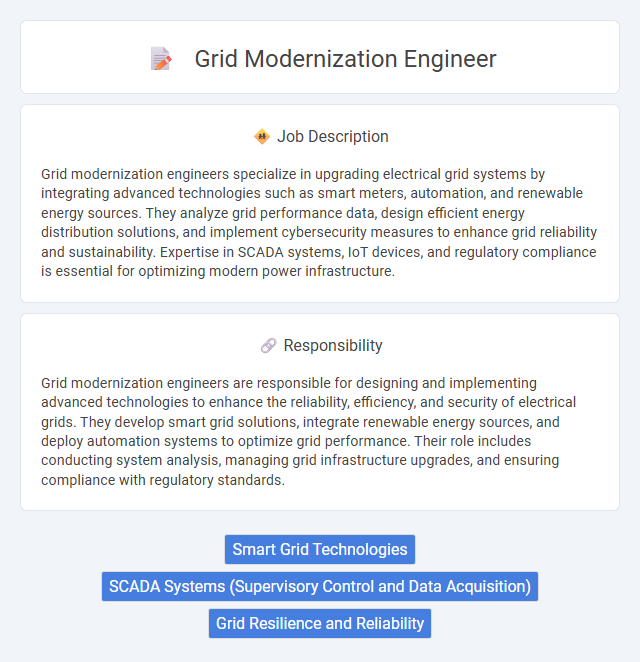
Grid modernization engineers specialize in upgrading electrical grid systems by integrating advanced technologies such as smart meters, automation, and renewable energy sources. They analyze grid performance data, design efficient energy distribution solutions, and implement cybersecurity measures to enhance grid reliability and sustainability. Expertise in SCADA systems, IoT devices, and regulatory compliance is essential for optimizing modern power infrastructure.
Individuals with a strong analytical mindset and passion for innovative energy solutions are likely to thrive as Grid Modernization Engineers. Those comfortable working in dynamic environments, adapting to rapidly evolving technologies, and collaborating with multidisciplinary teams may find this role well-suited to their skills. Candidates who prefer routine tasks or avoid complex problem-solving scenarios might find the demands of this position less compatible with their work style.
Qualification
A Grid Modernization Engineer requires a strong background in electrical engineering, power systems, and renewable energy integration. Proficiency in smart grid technologies, advanced metering infrastructure, and grid automation is essential. Relevant certifications such as PE (Professional Engineer) or specialized training in grid cybersecurity and data analytics enhance the qualification profile.
Responsibility
Grid modernization engineers are responsible for designing and implementing advanced technologies to enhance the reliability, efficiency, and security of electrical grids. They develop smart grid solutions, integrate renewable energy sources, and deploy automation systems to optimize grid performance. Their role includes conducting system analysis, managing grid infrastructure upgrades, and ensuring compliance with regulatory standards.
Benefit
A Grid Modernization Engineer likely improves energy efficiency and reliability by integrating advanced technologies into electrical grids. This role may enhance grid resilience, reducing outage frequency and duration, which benefits both utilities and consumers. The position could also drive the adoption of sustainable energy sources, contributing to environmental goals and long-term cost savings.
Challenge
Grid modernization engineers likely face complex challenges related to integrating advanced technologies into aging electrical infrastructure. They probably need to address issues such as improving grid reliability, enhancing cybersecurity measures, and incorporating renewable energy sources. Navigating regulatory requirements and managing cost constraints may also pose significant difficulties in this role.
Career Advancement
Grid modernization engineers drive the transition to smart electrical grids by integrating advanced technologies such as IoT, AI, and renewable energy systems, positioning themselves at the forefront of energy innovation. Expertise in grid automation, cybersecurity, and data analytics enhances career prospects, enabling advancement to senior roles like project manager, energy consultant, or technical director. Continuous upskilling in emerging standards and regulatory compliance accelerates career growth within utility companies and smart grid technology firms.
Key Terms
Smart Grid Technologies
Grid modernization engineers specialize in implementing Smart Grid Technologies that enhance the efficiency, reliability, and sustainability of electrical power systems. Their expertise includes deploying advanced metering infrastructure, automated distribution systems, and real-time data analytics to optimize grid performance and support renewable energy integration. They play a critical role in upgrading legacy grids with digital solutions that improve demand response, reduce outages, and enable scalable energy management.
SCADA Systems (Supervisory Control and Data Acquisition)
Grid modernization engineers specialize in enhancing SCADA (Supervisory Control and Data Acquisition) systems to improve real-time monitoring and control of electrical grids. These professionals design, implement, and maintain advanced SCADA architectures that optimize grid reliability, enable rapid fault detection, and support integration of renewable energy sources. Proficiency in communication protocols, cybersecurity measures, and data analytics tools is essential for ensuring efficient operation and resilience of modern electric utility networks.
Grid Resilience and Reliability
Grid modernization engineers play a critical role in enhancing grid resilience and reliability by integrating advanced technologies such as smart sensors, automated controls, and energy storage systems. They design and implement solutions to monitor and predict grid vulnerabilities, enabling rapid response to outages and minimizing interruptions. Their work supports the transition to a more flexible, adaptive electric grid capable of withstanding natural disasters, cyber-attacks, and fluctuating energy demands.
 kuljobs.com
kuljobs.com